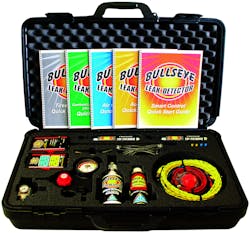Carbon dioxide leak detectors
[Editor's note 12/12/18: While this information first appeared in Professional Distributor's September 2016 Product Training, it is still a helpful overview for distributors today.]
Leaks can occur in many of the systems found in the vehicles of today, and the specific methods and equipment employed to find the leak site can vary based on the system to be diagnosed.
Advancements in technology have led to the development in new leak detection technology based on carbon dioxide (CO2), a tiny molecule that moves through small leak sites with great ease. Designed to be safe, easy to use and meant for all systems, this technology helps find leaks both large and small.
According to Bernie Thompson, founder, Automotive Test Solutions, a provider of diagnostic equipment (www.automotivetestsolutions.com), an advanced electronic CO2 leak detector can be used to locate the approximate area of the leak. Finding its exact location can be difficult when using a gas-based electronic leak detector, though, says Thompson, especially if there are several connections or components located within the same small area.
“Because CO2 can cause a specifically-formulated foam to change color, pinpointing the source of the leak is simplified,” Thompson says. “Leak seeker foam is applied to the general area identified by the advanced CO2 leak detector and the leaking CO2 changes the color of the foam from a pinkish red color to yellow at the exact location of the leak site. The use of CO2 gas makes false detection a thing of the past allowing you to be absolutely positive as to the location and size of the leak.”
According to Thompson, distributors should advise their customers to purchase a leak detection product that works for all of the sealed systems on a vehicle. A CO2 leak detector system, he says, will find leaks in the following:
- EVAP systems
- A/C systems
- Engine cooling systems
- Combustion gases in the cooling system
- Oil leaks
- Induction leaks
- Tires and wheels
- Air ride suspensions
- Air brakes
“(Customers need) a leak detection system that actually can find the hard leaks, the ones that create costly comebacks,” Thompson continues. “The leak detection system that a shop owner wants is the one that can find these hard leaks the first time in all the systems.
